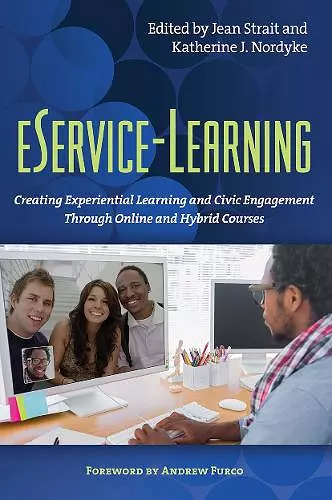eService-Learning
Creating Experiential Learning and Civic Engagement Through Online and Hybrid Courses
Jean R Strait editor Katherine Nordyke editor
Format:Paperback
Publisher:Taylor & Francis Inc
Published:1st Jun '15
Currently unavailable, and unfortunately no date known when it will be back
This paperback is available in another edition too:
- Hardback£145.00(9781620360637)

This book serves as an introduction to using online teaching technologies and hybrid forms of teaching for experiential learning and civic engagement. Service-learning has kept pace neither with the rapid growth in e-learning in all its forms nor with the reality that an increasing number of students are learning online without exposure to the benefits of this powerful pedagogy.Eservice-learning (electronic service-learning) combines service-learning and on-line learning and enables the delivery of the instruction and/or the service to occur partially or fully online. Eservice-learning allows students anywhere, regardless of geography, physical constraints, work schedule, or other access limitations, to experience service-learning. It reciprocally also equips online learning with a powerful tool for engaging students.In eservice-learning, the core components of service, learning, and reflection may take a different form due to the online medium—for example, reflection often occurs through discussion board interactions, journals, wikis, or blogs in an eservice-learning course. Moreover, the service, though still community-based, creates a world of opportunities to connect students with communities across the globe—as well as at their very own doorstep.This book introduces the reader to the four emerging types of eservice-learning, from Extreme EService-Learning (XE-SL) classes where 100% of the instruction and 100% of the service occur online, to three distinct forms of hybrid where either the service or the instruction are delivered wholly on-line – with students, for instance, providing online products for far-away community partners – or in which both are delivered on-site and online. It considers the instructional potential of common mobile technologies – phones, tablets and mobile reading devices. The authors also address potential limitations, such as technology challenges, difficulties sustaining three-way communication among the instructor, community partner, and students, and added workload.The book includes research studies on effectiveness as well as examples of practice such drafting grants for a community partner, an informational technology class building online communities for an autism group, and an online education class providing virtual mentoring to at-risk students in New Orleans from across the country.
“This book is to be commended for articulating a rationale for including outcomes related to civic engagement and service-learning in higher education and best practices for using online technologies to implement eService-Learning in courses and curricula. A conspicuous strength is the description of various eService-Learning models. As such, the volume is particularly valuable for faculty and administrators in higher education.”
Reflective Teaching (Wabash Center)
“Given the growing popularity of both e-learning and service-learning, something powerful is likely to happen when these two educational practices converge. And as is described in the chapters of this volume, e-Service-Learning has the potential to provide students with high impact, transformative learning experiences. It is through this volume that we learn how eService-Learning contains features of both e-learning and service-learning, but yet its essence is one that is distinct from either of these foundational instructional practices. Like the emergence of a new color when two distinct colors are blended, eService-Learning takes the high impact components of two different pedagogies to create a new, different, and unique educational experience for students.
As one of the first volumes to explore the practice of eService-Learning, EService-Learning: Creating Experiential Learning and Civic Engagement through Online and Hybrid Courses not only offers practitioners an understanding of the essentials of this emerging pedagogy, but it also explores important and key questions on the subject, laying the groundwork for further exploration and study. The field of eService-Learning is sure to gain prominence and popularity in the coming years. We will certainly look back at this book as a seminal volume that sought to unveil the power, complexity, and potential of this promising educational practice.”
Andrew Furco
University of Minnesota
ISBN: 9781620360644
Dimensions: unknown
Weight: 290g
192 pages